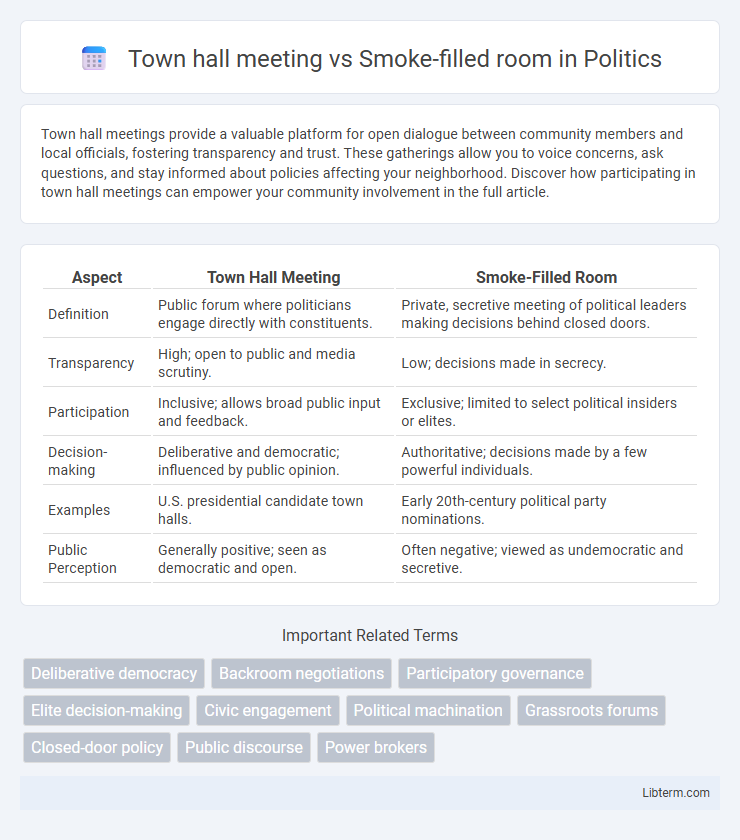Town hall meetings provide a valuable platform for open dialogue between community members and local officials, fostering transparency and trust. These gatherings allow you to voice concerns, ask questions, and stay informed about policies affecting your neighborhood. Discover how participating in town hall meetings can empower your community involvement in the full article.
Table of Comparison
| Aspect | Town Hall Meeting | Smoke-Filled Room |
|---|---|---|
| Definition | Public forum where politicians engage directly with constituents. | Private, secretive meeting of political leaders making decisions behind closed doors. |
| Transparency | High; open to public and media scrutiny. | Low; decisions made in secrecy. |
| Participation | Inclusive; allows broad public input and feedback. | Exclusive; limited to select political insiders or elites. |
| Decision-making | Deliberative and democratic; influenced by public opinion. | Authoritative; decisions made by a few powerful individuals. |
| Examples | U.S. presidential candidate town halls. | Early 20th-century political party nominations. |
| Public Perception | Generally positive; seen as democratic and open. | Often negative; viewed as undemocratic and secretive. |
Introduction: Defining Town Hall Meetings and Smoke-Filled Rooms
Town hall meetings are open forums where community members engage directly with leaders to discuss issues transparently and collaboratively. Smoke-filled rooms refer to secretive gatherings where decisions are made behind closed doors without public input. These contrasting settings highlight differences in democratic participation and decision-making processes.
Historical Origins of Decision-Making Spaces
Town hall meetings trace their origins to colonial New England, where open public gatherings facilitated direct democratic participation and transparent decision-making among community members. The smoke-filled room metaphor emerged from early 20th-century political contexts, symbolizing secretive negotiations held in private, often behind closed doors, where power brokers made decisions without public input. These historical origins highlight the contrast between inclusive grassroots engagement and exclusive elite deliberations in shaping political processes.
Transparency vs Secrecy in Governance
Town hall meetings embody transparency in governance by enabling open dialogue where citizens directly engage with elected officials and access real-time information about policy decisions. In contrast, smoke-filled rooms symbolize secrecy, where critical deliberations occur behind closed doors, often excluding public scrutiny and limiting accountability. This dichotomy highlights the impact of governance styles on public trust, with transparency fostering inclusiveness and secrecy breeding suspicion.
Inclusivity: Public Participation vs Elite Control
Town hall meetings emphasize inclusivity by encouraging broad public participation, allowing diverse community voices to influence decision-making processes. In contrast, smoke-filled rooms represent elite control where decisions are made behind closed doors by a select few, often excluding the general populace. This contrast highlights the democratic value of transparency and collective input against the exclusivity and secrecy of elite-driven governance.
Decision-Making Processes Compared
Town hall meetings promote transparent decision-making processes by involving a broad group of stakeholders in open discussions, fostering collective input and democratic participation. In contrast, smoke-filled room decisions are made behind closed doors by a select few, often prioritizing secrecy and power dynamics over inclusivity. The transparency and inclusiveness of town hall meetings tend to enhance trust and accountability, while smoke-filled rooms may expedite decisions but risk alienating broader organizational or community interests.
Impact on Policy Outcomes
Town hall meetings promote transparency and encourage direct citizen participation, leading to policy outcomes that better reflect public opinion and diverse perspectives. In contrast, smoke-filled room decision-making often results in opaque negotiations among elite stakeholders, which may produce policies favoring special interests rather than the broader community. The inclusivity of town halls generally enhances democratic accountability and legitimacy in policy formulation.
Trust and Accountability in Each Approach
Town hall meetings foster trust through transparency and direct communication between leaders and participants, enabling accountability by addressing concerns openly and documenting decisions publicly. In contrast, decisions made in smoke-filled rooms often breed distrust due to their secretive nature, limiting accountability as key stakeholders are excluded from the process. Trust and accountability are significantly higher in town hall meetings, as they emphasize inclusivity and public scrutiny.
Modern Examples and Case Studies
Town hall meetings exemplify transparent decision-making, as seen in companies like Google, where open forums encourage employee input and foster innovation. In contrast, smoke-filled rooms persist in modern politics, such as in the early stages of Brexit negotiations, where key decisions were made behind closed doors, limiting public accountability. Case studies from tech startups reveal that participatory approaches boost morale and creativity, whereas clandestine meetings often generate distrust and resistance.
Advantages and Disadvantages of Both Models
Town hall meetings promote transparency and inclusivity by allowing broad participation and open dialogue, fostering diverse perspectives and collective decision-making; however, they can be time-consuming and may lead to less efficient outcomes due to potential disagreements and lack of consensus. Smoke-filled room negotiations enable swift decision-making with fewer participants, often resulting in streamlined agreements and confidentiality, but risk exclusion of key stakeholders and lack of accountability, potentially leading to distrust and resistance. Balancing these models depends on organizational goals, with town halls favoring democratic engagement and smoke-filled rooms prioritizing expediency and discretion.
Future Trends in Deliberative Spaces
Town hall meetings promote transparency and broad citizen engagement, leveraging digital platforms to facilitate inclusive dialogue and real-time feedback. Smoke-filled rooms, symbolizing opaque decision-making, face increasing scrutiny as organizations adopt virtual deliberative spaces incorporating AI to analyze sentiment and encourage equitable participation. Future trends emphasize hybrid formats blending physical and online interactions, enhancing accessibility while ensuring accountability in democratic processes.
Town hall meeting Infographic

 libterm.com
libterm.com